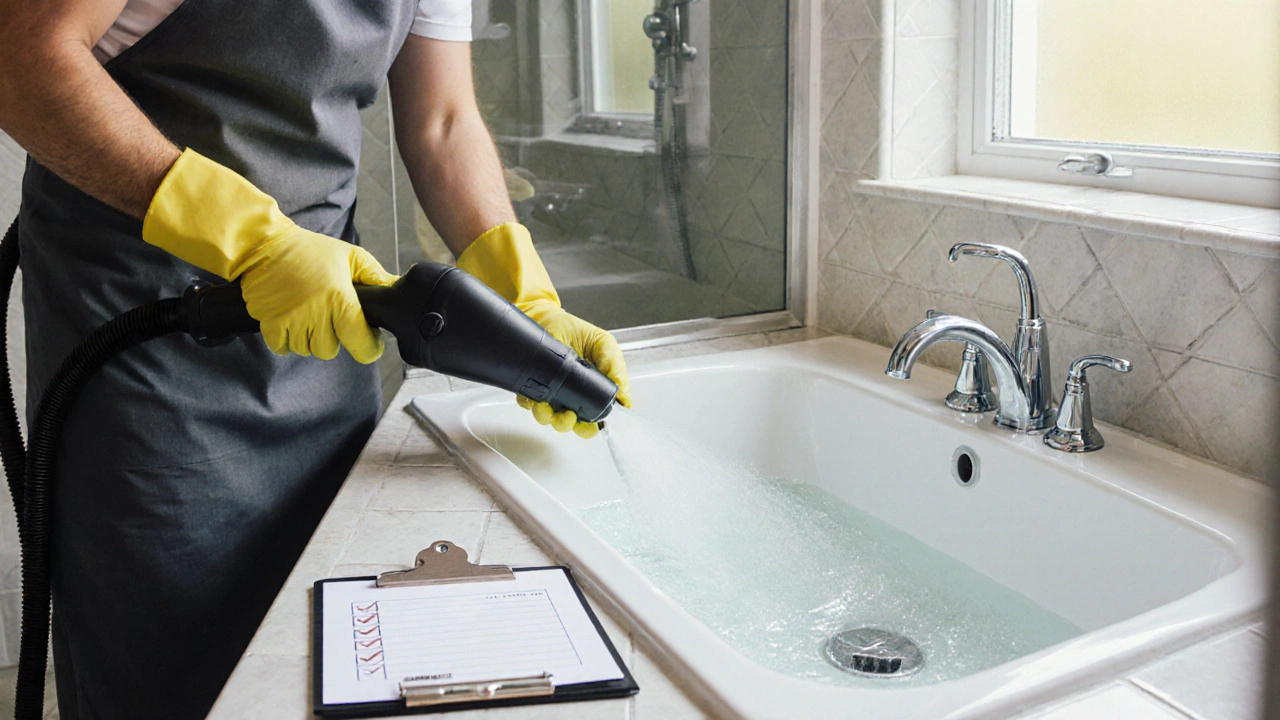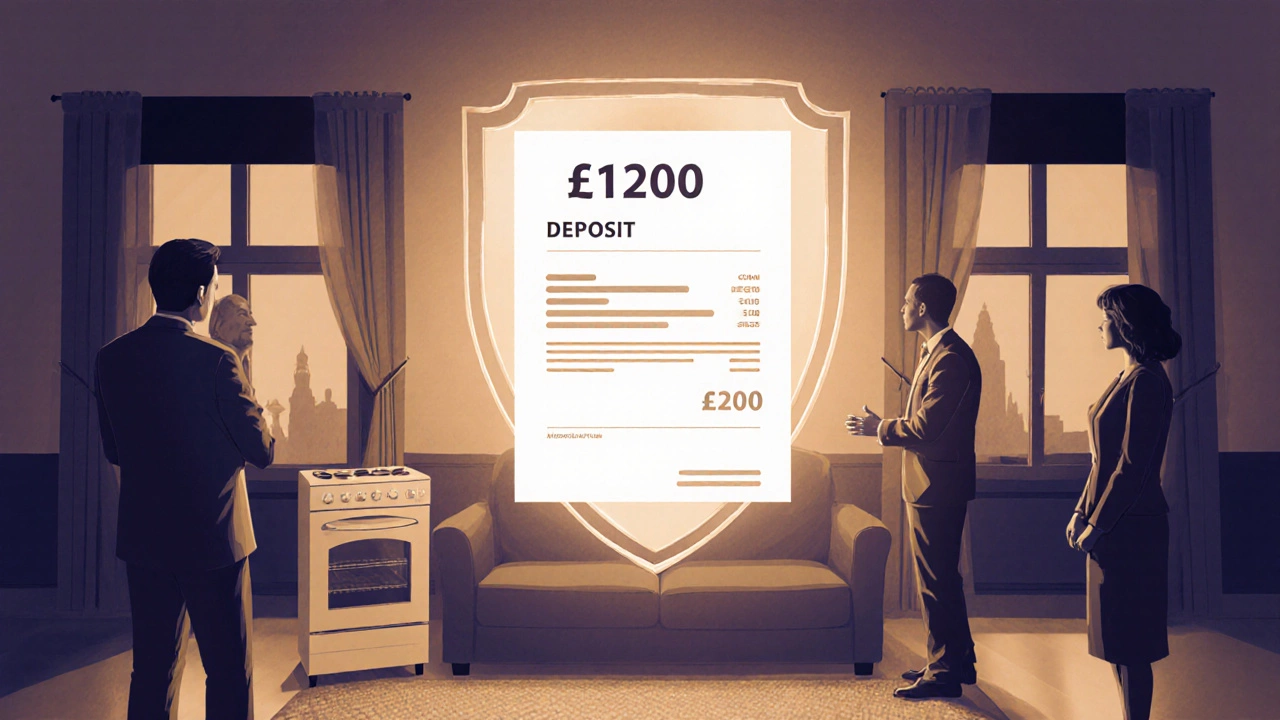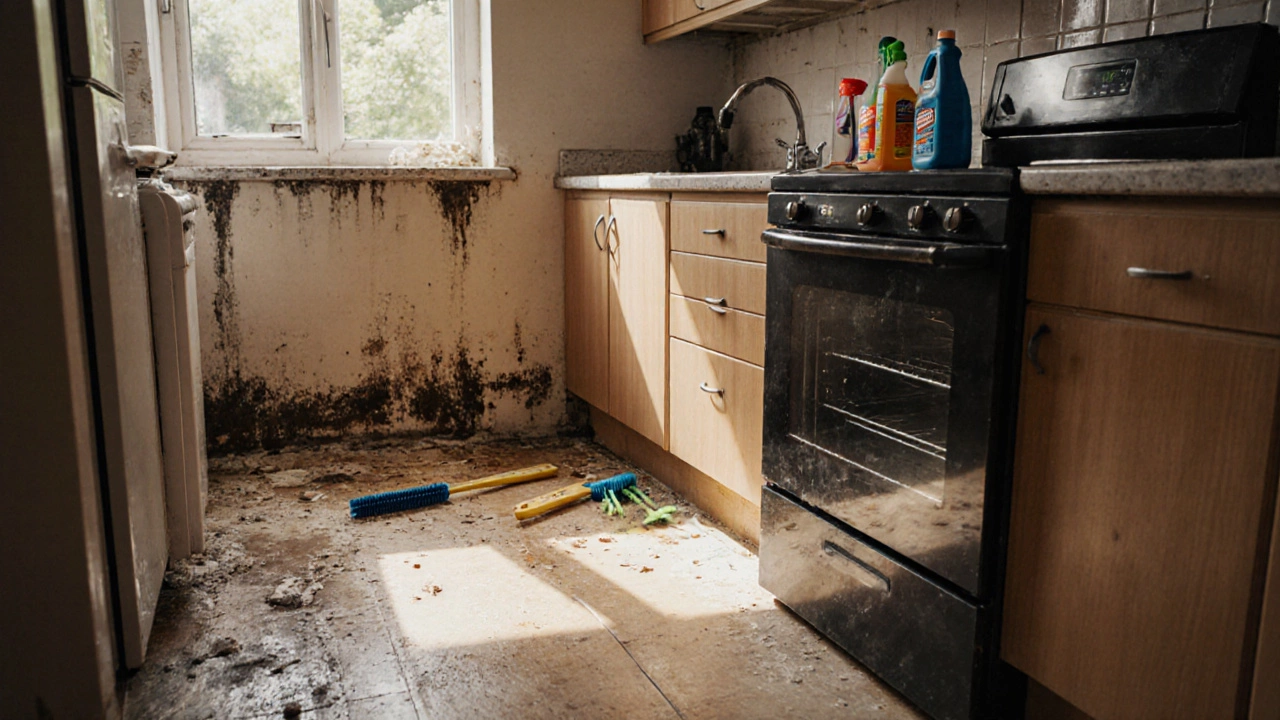End of Tenancy Cleaning Cost Calculator
How Much Does It Really Cost?
Calculate whether cleaning yourself saves money or if professional service protects your deposit.
When you’re moving out of a rented flat or house, the thought of scrubbing every corner from top to bottom can feel overwhelming. You’ve lived there for months or years. You’ve spilled coffee, tracked in mud, forgotten about dust behind the fridge. Now, your landlord says you need end of tenancy cleaning to get your deposit back. But hiring professionals costs £150-£300. Is it really worth it?
What Landlords Actually Require
Most tenancy agreements in the UK say you must return the property in the same condition as when you moved in-minus fair wear and tear. That sounds simple, but it’s where most disputes happen. Landlords don’t expect a spotless museum. They expect clean enough to rent to the next tenant without spending extra.
According to the UK’s Tenancy Deposit Scheme (TDS), common reasons for deposit deductions include:
- Stains or grease on carpets and floors
- Build-up of mould in bathrooms or kitchens
- Dirty ovens, hobs, or fridges
- Unclean windows inside and out
- Dust in skirting boards, vents, or light fittings
- Grime in bathroom grout or shower trays
These aren’t minor issues. They’re the kind of dirt that takes hours to remove and often requires specialized tools. A quick wipe-down won’t cut it. If your landlord hires a professional cleaner after you leave, they’ll deduct the cost from your deposit-plus a handling fee. That’s often more than if you’d hired someone yourself.
The Real Cost of DIY vs Professional Cleaning
Let’s say you live in a 3-bedroom flat in Bristol. You’ve got a 12-month tenancy. You think you can clean it yourself. You’ll need:
- 10+ hours of your time (weekends included)
- £50-£80 on cleaning supplies (industrial degreasers, grout cleaner, microfiber cloths, rubber gloves, buckets)
- Physical strain-on your back, knees, wrists
- Risk of damaging surfaces with wrong products
- Stress from rushing before your move-out date
Now, compare that to hiring a professional. A standard end of tenancy clean for a 3-bedroom flat in Bristol costs between £180 and £260. Most companies include:
- Deep cleaning of kitchen appliances (inside and out)
- Scrubbing bathrooms, including grout and tiles
- Polishing all glass surfaces, inside and out
- Cleaning carpets and floors with industrial machines
- Wiping down walls, skirting boards, light switches
- Removing limescale from taps and showerheads
- Emptying and sanitizing bins
- A signed certificate of cleaning
That certificate matters. It’s your proof that the property was professionally cleaned. Landlords and deposit schemes accept it as evidence. You won’t get that from a photo of your mop bucket.
How Much Deposit Are You Risking?
Let’s say your deposit is £1,200. You think you can save £200 by cleaning yourself. But here’s the catch: if you miss one thing-say, a greasy oven or stained carpet-your landlord can legally deduct £200-£400 to cover professional cleaning.
That’s not hypothetical. In 2024, the TDS reported that 38% of deposit disputes in the South West of England were over cleaning. In 62% of those cases, the landlord won because the tenant couldn’t prove the property was cleaned properly. Many tenants thought they’d done a good job-until they saw the before-and-after photos from the next tenant’s move-in inspection.
Professional cleaners know what inspectors look for. They’ve cleaned hundreds of properties. They know where dust hides. They know which cleaners remove tea stains from porcelain without scratching. They use HEPA vacuums, steam cleaners, and industrial-grade products you don’t have access to.

When DIY Might Work (and When It Won’t)
You might think: “I’m a tidy person. I clean weekly. I can handle this.” Maybe. But cleaning regularly is not the same as cleaning to deposit-return standard.
Here’s what most people underestimate:
- Behind appliances: Fridge coils, washer drums, and oven vents collect grease and dust you never see. Cleaning them requires moving heavy appliances-a job most tenants avoid.
- Windowsills and tracks: Years of dirt build-up in window grooves is nearly impossible to remove without a scraper and specialized cleaner.
- Grout lines: Bathroom grout turns black from soap scum and mildew. Regular bleach won’t touch it. You need a steam cleaner or acid-based grout cleaner-and you need to know how to use it safely.
- Carpet stains: Wine, pet accidents, ink-they set in. DIY spot cleaners often spread the stain. Professionals use hot water extraction.
If you’re renting a house with a garden, you also need to clean outdoor areas: patios, railings, and even gutters. Most tenants forget these. Landlords notice.
What You Get With a Professional Service
It’s not just about cleaning. It’s about peace of mind.
- Guarantee: Most companies offer a 7-day guarantee. If the landlord says something’s missed, they’ll come back free.
- Insurance: Reputable cleaners are insured. If they accidentally break a tile or scratch a surface, you’re covered.
- Time: You get back 10-15 hours of your life. That’s a full weekend. You could use it to relax, pack, or start your new job.
- Proof: A signed cleaning certificate removes doubt. No arguments. No delays.
Some companies even offer a free pre-move-out inspection for £25. You pay upfront, they walk through the property with you, point out problem areas, and you fix them before the big clean. It’s like a dry run for your deposit.

How to Choose a Reliable Cleaner
Not all end of tenancy cleaners are equal. In Bristol, you’ll find everything from one-person operations to national chains. Here’s what to look for:
- Check reviews: Look for recent reviews on Google and Trustpilot. Avoid companies with fewer than 50 reviews or ratings under 4.5.
- Ask for a checklist: A professional cleaner will give you a detailed list of what’s included. If they say “we clean everything,” ask for specifics.
- Get a quote in writing: Prices should be based on property size, not a flat rate. A 1-bedroom flat shouldn’t cost the same as a 4-bedroom house.
- Ask about insurance: Always confirm they have public liability insurance. If they don’t, walk away.
- Book early: Cleaners get booked out 2-3 weeks ahead during peak moving months (July-September). Don’t wait until the last week.
Most good cleaners in Bristol offer same-day or next-day service for an extra £30-£50 if you’re in a rush. It’s worth it if you’re trying to avoid deposit deductions.
Final Decision: Is It Worth It?
Yes. For 9 out of 10 people, end of tenancy cleaning is worth it.
Think of it this way: You’re not paying for a clean house. You’re paying for your deposit back. And if your deposit is £1,000 or more, spending £200 to protect it isn’t an expense-it’s insurance.
Even if you’re confident in your cleaning skills, you’re not an inspector. You don’t know what the landlord’s checklist looks like. You don’t know what the next tenant’s cleaning company will find. You don’t want to argue over a £300 deduction because you missed the inside of the microwave.
Professional end of tenancy cleaning isn’t a luxury. It’s a smart, low-risk move that saves you stress, time, and money. In a system where landlords have the upper hand, this is one thing you can control. Do it right. Get the certificate. Walk away with your deposit-and your sanity.
Do I need to clean the oven if I barely used it?
Yes. Even if you didn’t use the oven, landlords expect it to be free of grease, food residue, and dust inside and out. The oven is one of the most common reasons for deposit deductions. A quick wipe isn’t enough-you need to remove baked-on grime, which requires specialized cleaners and scrubbing tools.
Can I use my own cleaning products?
You can, but most professional cleaners bring their own. They use industrial-grade products that are more effective and safer for surfaces. If you’re doing it yourself, avoid bleach on grout or vinegar on stone countertops-they can cause damage. Stick to pH-neutral cleaners for tiles and glass.
What if my landlord says the cleaning wasn’t good enough?
If you hired a professional and they gave you a certificate, that’s your strongest defense. Landlords must provide before-and-after photos and itemized costs if they deduct from your deposit. You can challenge the deduction through the Tenancy Deposit Scheme. Most disputes are resolved in the tenant’s favor when proof of professional cleaning is provided.
Is end of tenancy cleaning the same as a spring clean?
No. A spring clean is general tidying. End of tenancy cleaning is a detailed, checklist-driven process focused on returning the property to its original condition. It includes deep cleaning areas most people ignore-like behind appliances, inside vents, and under sinks. It’s more thorough and follows specific industry standards.
How far in advance should I book a cleaner?
Book at least 2 weeks ahead, especially if you’re moving between June and September. In Bristol, demand spikes during university move-out periods. Last-minute bookings can cost extra or be unavailable. If you’re on a tight schedule, some companies offer priority slots for an additional fee.
